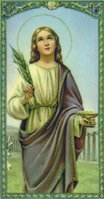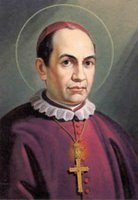Saint Lucy (and Linus & Lucy)

Lucy's name means "light", with the same root as "lucid" which means "clear, radiant, understandable." Unfortunately for us, Lucy's history does not match her name.
Because people wanted to shed light on Lucy's bravery, legends grew up. The one that is passed down to us tells the story of a young Christian woman who had vowed her life to the service of Christ. Her mother tried to arrange a marriage for her with a pagan. Lucy apparently knew that her mother would not be convinced by a young girl's vow so she devised a plan to convince her mother that Christ was a much more powerful partner for life. Through prayers at the tomb of Saint Agatha, her mother's long illness was cured miraculously. The grateful mother was now ready to listen to Lucy's desire to give her money to the poor and commit her life to God.
Unfortunately, legend has it, the rejected bridegroom did not see the same light and he betrayed Lucy to the governor as a Christian. This governor tried to send her into prostitution but the guards who came to take her way found her stiff and heavy as a mountain. Finally she was killed. As much as the facts of Lucy's specific case are unknown, we know that many Christians suffered incredible torture and a painful death for their faith during Diocletian's reign. Lucy may not have been burned or had a sword thrust through her throat but many Christians did and we can be sure her faith withstood tests we can barely imagine.
Lucy's name is probably also connected to statues of Lucy holding a dish with two eyes on it. This refers to another legend in which Lucy's eyes were put out by Diocletian as part of his torture. The legend concludes with God restoring Lucy's eyes.
Lucy's name also played a large part in naming Lucy as a patron saint of the blind and those with eye-trouble.
Whatever the fact to the legends surrounding Lucy, the truth is that her courage to stand up and be counted a Christian in spite of torture and death is the light that should lead us on our own journeys through life.
We'll enjoy a traditional St. Lucy's Feast tonight and afterwards we'll all watch "A Charlie Brown Christmas."

